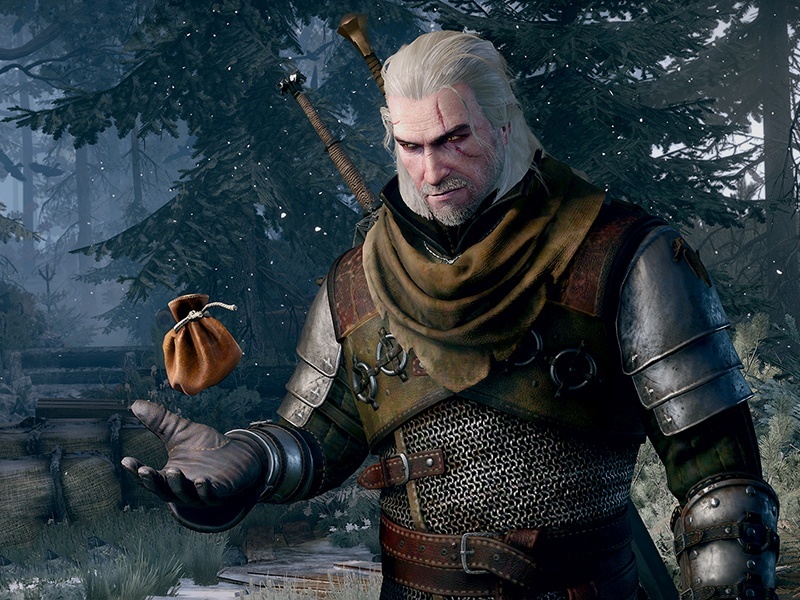
HOPE 10: Access for AllIn the old days, finding a game was a challenge in it itself. To find a title, you had to head down to the local gaming emporium to hunt out the title you knew in advance that you wanted. It could easily not be in stock, however, leaving you high and dry. Finding a lesser known title was a risk at best. Maybe that Suikoden game would be horrible, or maybe that Bubsy one would be great. It was all up to luck, yet that has changed. With the rise of the Internet, many products have come forth in a deluge. Not only are the great titles in near-infinite abundance now, but accessing them is a mere click away. Finding a lesser-known release is not an issue of spotting a rare gem upon a shelf but seeing it upon the front page. Not only are the top games known but so are the unknown. Learning about Recettear isn't a matter of hearing about it from a friend beforehand but seeing it up and marked for sale, available for all to see.
FEAR 10: No Ownership
With all this access comes one big catch: these games are not actually 'owned' - they are licensed. This is a different beast and than actual ownership and can result in a ton of legal issues should things go south. Bought a game and didn't like it? It's unlikely you will be able to sell it off to a friend or even return it, especially if everything goes digital and game stores shut down. Did the service you use go under? If the service required you to check-in every once in a while, then that means your entire game collection is basically on a timer system! Maybe some intrepid programmer will figure out a work-around, but until then your only choice is to chew through as many as possible before time runs out.
HOPE 9: What's Old is New
How many people have heard of Chrono Trigger? For those who have hung out in gaming circles for a while, the answer is likely 'many,' yet without using an emulator, it was impossible to play. Unless you were lucky enough to find a copy from back in the day, you were high and dry… until the DS release, that is. Then an entire generation of people who simply never could play it in the first place had access to it. Many of these games have withstood the test of time for a reason, and now people will be able to see that reason - those who never had a chance before.

FEAR 9: What's New is Old
How many people played Final Fantasy V? Unless you live in Japan or had an imported console, likely zero before the GBA version was released. Even then, many people simply never knew about it, yet now it's released on Steam for all to play with a simple search. However, these old games can make a lot of money for relatively little improvement. Certain titles will make leaps forwards, of course, but many will remain largely unchanged; and there is little reason to not release them again. Suddenly you've bought a game originally on the PS for your PS3, then PS4, and then PS5, simply so that you won't have to dust off the console every time you want to play it, because you will want to play it because it's a good game…but each re-release is more money in the publisher's pockets.
HOPE 8: Massive Games
There is no denying it - with the passage of time, games have become huge. Many older titles simply couldn't manage the amount of data needed to play these new offerings. Even reducing the graphics of Fallout 4 to the bare minimum, it would likely be very hard to make it work on a PS2 without some serious cuts, and likely an extra disc or two. Something like World of Warcraft would simply have not been feasible back when Final Fantasy VI, or even IX, came out, yet now it's 'old news.' The scope of games is simply much larger than previously thought possible. With luck, this will keep increasing until every product is a wonderland.
FEAR 8: No Quality Control
In a massive adventure, there are bound to be bugs and flaws. After all, it's massive… An AI having pathing problems in a particular piece of terrain, a boulder not appearing right, or a bandit accidentally spawning below the ground, will likely happen eventually; but that's a lot different from simple, lazy programming or design. Bethesda gets a lot of flack for this as it tends to be easier than normal to get its games to flip out, but other companies mess up, too. Bioware has had plenty of issues itself, as have other developers. It's one thing when they get patched, but it's far from unknown for a developer to be apathetic or care only that you bought the game. That the combat is a horribly broken mess that makes it unworthy of even a second of time? Not their problem.

HOPE 7: Expansions and DLC
In the past, expansions were a rare thing. After all, 'expanding' A Link to the Past would have been near impossible with the cartridge, and even on the PC the content had to be quite substantial, as it would likely be years before another DLC could be released, yet now it's a simple matter of popping online. Want to replace Link with Tingle? All it would take is a few bucks to re-skin him.
FEAR 7: Expansions and DLC
With this comes a deep fear. Log on to Origin and look at the expansions and DLC for The Sims 3. It's US$20 per expansion and DLC regardless of what they offer. In many other games, it's blatant that things were cut, left unfinished, or it's clear that they will work to expand upon it later… for extra cash, of course. Gaining full access to your game might cost an additional $60+ simply because the developer locked some costumes and furniture behind a paywall for no reason other than to make you cough up more. It is such a sore topic that Cubed3 has not just touched upon it once, but even gone into more detail on the subject a second time.
HOPE 6: New Technology Allows for New Possibilities
There is no denying it, many things simply weren't possible on older consoles. The tech was limited and many ideas simply hadn't had the time to develop. The idea of a social game played on Facebook would simply be out of the question; never mind a good one. Something like Minecraft would have been a fevered dream at best. The notion of being able to head out into the world and be able to see and capture Pokémon would have been a fantasy, yet these things are becoming a reality now with new tech and ideas blooming.

FEAR 6: The Old Ways are Forgotten
Remember platformers? How they used to be everywhere for the longest time until, suddenly, many of them just… vanished? Remember turn-based RPGs? Nowadays, many would argue that these things should be pushed aside and forgotten simply to embrace new ideas and technology. The Final Fantasy VII remake is a prime example of this. With the new tech, Square Enix is clearly trying to make the battles real-time and the like. This may not be a bad thing, but part of the reason why people loved the original was its battle system and forsaking it is a gamble at best… all to appeal to an audience that may not even care, or worse.
HOPE 5: More Women Will Become Involved in Gaming
It's no secret that women are cool. Making up half the population many women in the past have been driven away from gaming. Maybe it was the stigma of games being for men. Maybe it was social pressure to focus on other things. It doesn't really matter. What does matter is that this is changing now. With more people becoming involved, it means a new influx of ideas, new people to socialise with, and the breakdown of old stigma's in favour of acceptance.
FEAR 5: They Won't Become 'Gamers'
What games are produced depends heavily on the audience. There is nothing wrong with this, as it makes perfect business sense. You don't make a puzzle game to appeal to people more interested in action, after all. However, if there is suddenly a massive influx of women, yet they only stick to one primary type of game, instead of branching out and trying new things, then the balance becomes heavily lopsided. Instead of focusing on more involved titles, it becomes more profitable to churn out a slew of low-quality products that pander to this new audience who may not even consider changing anytime soon - all without changing the stigmas, bringing in new ideas, not attempting to socialise beyond pre-existing circles, or anything positive. More women involved in gaming is great; game companies not trying to make good titles and abandoning old audiences, in favour of a new audience that may not change its tastes for years, though, is not great.
HOPE 4: Everyone Will Play
Riding off the last two points, being able to play with anyone is awesome. Imagine being able to go almost anywhere and find someone willing to play a game with you. Even as a mere conversation starter or water-cooler talk, to have such a barrier broken down would be a simple wonder. While there will always be people who play more, or who refuse to play, to have even one more touchstone to connect with others is superb.

FEAR 4: Everyone Will Play
In China a 'game' was launched that basically tracks your purchases, online activities, and the like, and rewards people who do 'positive' things, such as link to pro-government websites. Doing well grants rewards. As of now, it's optional, but it will be mandatory in the future. Worse still, the people you associate with have an effect on your score. Associate with someone who isn't a big fan of the government and you will either need to bring them in line or ostracise them to keep a higher score, and real-life benefits high. Real-life friends may vanish because you bring their score down because you made a purchase that the government deemed 'bad.'
HOPE 3: Fear of Games Will Vanish
Even today, many of the old stigmas remain. Games breed violence. People who play them are dumber. People who play them are sexist. They aren't mature. They aren't this, or that, or whatever… yet with the rise of games in the media in general, more time in the limelight has been given to these titles, more information revealed, and more understanding given. With luck, this means that people will start to learn the truth and the stigmas will vanish.
FEAR 3: The Bad Will be Pushed into the Limelight
Remember Hatred? There is no doubt that it was a very violent, disturbing product, especially to a populace still getting comfortable with the idea of gaming. There is no denying it, there are some releases that are very violent, that are sexist or discriminatory, that are immature, and are bad in general. Sadly, these are also the ones most likely to get into the limelight and trotted out for display. No one looking for a news story cares about Goat Simulator, but a game with a discriminatory scene? Boo yea! Tons of free press coverage!

HOPE 2: The Media Will Shape Up
Gaming media is wonky at best. Reviews are often split and can easily end up disagreeing with the public. Some are viewed as being bought by companies wanting high ratings. Sometimes the media will focus on minor things to make a game seem more important than it is. Sure, it does do some things right, but it also does some things wrong, and those things are often not minor. With luck, the media will learn from its past mistakes and begin to change, learn to stop selling out, to publish actually informative and useful articles, and so on, and so forth.
FEAR 2: They Will Forget Who They Are
Regardless of your stance on a certain issue more than a year old now, one thing should be easily agreeable to all sides: the Gaming Press should be about gaming. It's who it is and the audience it serves, yet it's quite easy to end up abusing that position to push personal views. Is a game good? Is it bad? Remaining transparent and explaining why can be very challenging and it can be quite easy to end up releasing biased reviews or articles simply because the author favoured, or hated, a certain thing. The media stops being media and becomes opinion pieces with little backing and presented as fact.
FEAR 1: Budgets Will Balloon Out of Control
The Witcher 3 had a budget of US$81,000,000. This means that, to break even, it had to sell roughly 1,350,000 copies. There may be more to it that would change the price, but assume that these sorts of budgets keep on increasing and increasing. Soon many games will simply need to sell enormous amounts to simply break even, leading to market over-saturation and a lack of variation, as even a tiny risk can cost millions if it goes wrong. The game stops being about making a good product, and instead is more focused on marketing. Regardless of your feelings on the latest Star Wars Battlefront release, it's clear much of it was based on the idea of trying to sell as many copies as possible via marketing. It was released so close to the launch of the new movie to drum up sales. Its expansion was timed to make people more interested. It focused heavily on flash and appearing as pretty as possible. It wasn't cheap to make. It didn't sell for a low price, either, seeing how expensive its special editions got. Look at all the pretty graphics in many modern games and just try to imagine how much they cost, and how many copies will need to be sold simply to make back the amount of cash they spent on realistic grass.

HOPE 1: People Will Realise that Games Should be Games
At the end of the day, no matter how big the budget, how pretty the graphics, or anything, it will be time to sit down and play the game. This is where the true test begins, and where it will get seen if it was money well spent. It doesn't matter if millions upon millions of dollars were laid down on a high-end title if playing Super Mario Maker can deliver hours of endless fun by simply making a plethora of cannons that can shoot coins or Goomba enemies. It doesn't matter if a game is indie or AAA. It doesn't matter if it holds a deep message or is just about designing a city. All that matters is the fun factor. Games that remember this, that they are games, should flourish. Games that forget this should be buried and forgotten about. With any luck, with hope, people will come about to realise this and a step forwards can be made.

 Sign In
Sign In 13.03.2016
13.03.2016  Darkflame
Darkflame 
 Link to this post:
Link to this post:  Subscribe to this topic
Subscribe to this topic Features
Features






 Top
Top

